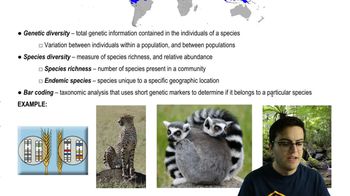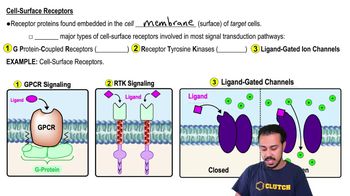Suppose that during a detailed anatomical study of a marine invertebrate, you found a small, previously undescribed structure. How would you test the hypothesis that the structure is a gland that releases one or more hormones?
Table of contents
- 1. Introduction to Biology2h 42m
- 2. Chemistry3h 40m
- 3. Water1h 26m
- 4. Biomolecules2h 23m
- 5. Cell Components2h 26m
- 6. The Membrane2h 31m
- 7. Energy and Metabolism2h 0m
- 8. Respiration2h 40m
- 9. Photosynthesis2h 49m
- 10. Cell Signaling59m
- 11. Cell Division2h 47m
- 12. Meiosis2h 0m
- 13. Mendelian Genetics4h 44m
- Introduction to Mendel's Experiments7m
- Genotype vs. Phenotype17m
- Punnett Squares13m
- Mendel's Experiments26m
- Mendel's Laws18m
- Monohybrid Crosses19m
- Test Crosses14m
- Dihybrid Crosses20m
- Punnett Square Probability26m
- Incomplete Dominance vs. Codominance20m
- Epistasis7m
- Non-Mendelian Genetics12m
- Pedigrees6m
- Autosomal Inheritance21m
- Sex-Linked Inheritance43m
- X-Inactivation9m
- 14. DNA Synthesis2h 27m
- 15. Gene Expression3h 20m
- 16. Regulation of Expression3h 31m
- Introduction to Regulation of Gene Expression13m
- Prokaryotic Gene Regulation via Operons27m
- The Lac Operon21m
- Glucose's Impact on Lac Operon25m
- The Trp Operon20m
- Review of the Lac Operon & Trp Operon11m
- Introduction to Eukaryotic Gene Regulation9m
- Eukaryotic Chromatin Modifications16m
- Eukaryotic Transcriptional Control22m
- Eukaryotic Post-Transcriptional Regulation28m
- Eukaryotic Post-Translational Regulation13m
- 17. Viruses37m
- 18. Biotechnology2h 58m
- 19. Genomics17m
- 20. Development1h 5m
- 21. Evolution3h 1m
- 22. Evolution of Populations3h 53m
- 23. Speciation1h 37m
- 24. History of Life on Earth2h 6m
- 25. Phylogeny2h 31m
- 26. Prokaryotes4h 59m
- 27. Protists1h 12m
- 28. Plants1h 22m
- 29. Fungi36m
- 30. Overview of Animals34m
- 31. Invertebrates1h 2m
- 32. Vertebrates50m
- 33. Plant Anatomy1h 3m
- 34. Vascular Plant Transport1h 2m
- 35. Soil37m
- 36. Plant Reproduction47m
- 37. Plant Sensation and Response1h 9m
- 38. Animal Form and Function1h 19m
- 39. Digestive System1h 10m
- 40. Circulatory System1h 49m
- 41. Immune System1h 12m
- 42. Osmoregulation and Excretion50m
- 43. Endocrine System1h 4m
- 44. Animal Reproduction1h 2m
- 45. Nervous System1h 55m
- 46. Sensory Systems46m
- 47. Muscle Systems23m
- 48. Ecology3h 11m
- Introduction to Ecology20m
- Biogeography14m
- Earth's Climate Patterns50m
- Introduction to Terrestrial Biomes10m
- Terrestrial Biomes: Near Equator13m
- Terrestrial Biomes: Temperate Regions10m
- Terrestrial Biomes: Northern Regions15m
- Introduction to Aquatic Biomes27m
- Freshwater Aquatic Biomes14m
- Marine Aquatic Biomes13m
- 49. Animal Behavior28m
- 50. Population Ecology3h 41m
- Introduction to Population Ecology28m
- Population Sampling Methods23m
- Life History12m
- Population Demography17m
- Factors Limiting Population Growth14m
- Introduction to Population Growth Models22m
- Linear Population Growth6m
- Exponential Population Growth29m
- Logistic Population Growth32m
- r/K Selection10m
- The Human Population22m
- 51. Community Ecology2h 46m
- Introduction to Community Ecology2m
- Introduction to Community Interactions9m
- Community Interactions: Competition (-/-)38m
- Community Interactions: Exploitation (+/-)23m
- Community Interactions: Mutualism (+/+) & Commensalism (+/0)9m
- Community Structure35m
- Community Dynamics26m
- Geographic Impact on Communities21m
- 52. Ecosystems2h 36m
- 53. Conservation Biology24m
43. Endocrine System
Endocrine System
Problem 12
Textbook Question
<Image>
Ecotourism helps conserve wildlife by increasing the value of wildlife conservation for local people. In Argentina, the world’s largest breeding colony of Magellanic penguins is visited by thousands of tourists every year, causing the penguins to become habituated to the presence of people. Has ecotourism affected the penguins’ ability to respond to stressors? Has it affected the penguins’ secretion of corticosterone?
In what part(s) of a target cell would you expect to find corticosterone receptors?
 Verified step by step guidance
Verified step by step guidance1
Understand the role of ecotourism: Ecotourism aims to conserve wildlife by making wildlife conservation economically beneficial for local communities. In this context, consider how the presence of tourists might influence the behavior and physiology of Magellanic penguins.
Consider the concept of habituation: Habituation is a process where animals become accustomed to repeated exposure to a stimulus, such as human presence, and gradually show less response to it. Evaluate whether the penguins' habituation to tourists might affect their stress response.
Explore the stress response in animals: Animals, including penguins, respond to stressors by secreting hormones like corticosterone. Investigate whether the habituation to tourists has altered the penguins' secretion levels of corticosterone, which is a key indicator of stress.
Identify the role of corticosterone: Corticosterone is a glucocorticoid hormone involved in the stress response. It helps regulate energy, immune reactions, and stress responses. Consider how changes in corticosterone levels might reflect the penguins' adaptation to human presence.
Locate corticosterone receptors: Corticosterone receptors are typically found in the cytoplasm of target cells. Once corticosterone binds to these receptors, the complex can enter the nucleus to influence gene expression. Consider how this mechanism might be involved in the penguins' physiological response to stress.
 Verified video answer for a similar problem:
Verified video answer for a similar problem:This video solution was recommended by our tutors as helpful for the problem above
Video duration:
2mPlay a video:
Was this helpful?
Key Concepts
Here are the essential concepts you must grasp in order to answer the question correctly.
Ecotourism and Wildlife Conservation
Ecotourism is a form of sustainable travel that supports conservation efforts and benefits local communities. By increasing the economic value of wildlife conservation, ecotourism can incentivize local people to protect natural habitats and species. In the context of Magellanic penguins in Argentina, ecotourism may influence their behavior and stress response due to increased human interaction.
Recommended video:
Guided course

Conservation Biology and Biodiversity
Stress Response in Animals
Animals respond to stressors through physiological changes, often involving the secretion of hormones like corticosterone. This hormone helps manage energy and stress levels, preparing the animal to cope with challenges. Understanding how ecotourism impacts the stress response in penguins involves studying changes in corticosterone levels and their ability to adapt to human presence.
Recommended video:
Guided course

Inflammatory Response
Corticosterone Receptors in Target Cells
Corticosterone receptors are typically found in the cytoplasm of target cells, where they bind to the hormone and initiate a cellular response. Upon binding, the receptor-hormone complex can enter the nucleus to influence gene expression, affecting the cell's function. Identifying the location of these receptors helps understand how corticosterone impacts penguin physiology and stress adaptation.
Recommended video:
Guided course

Cell-Surface Receptors
Related Videos
Related Practice
Textbook Question
732
views


